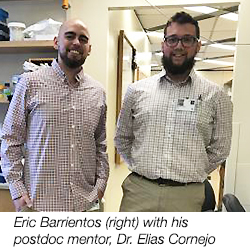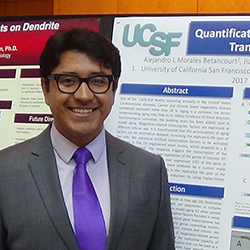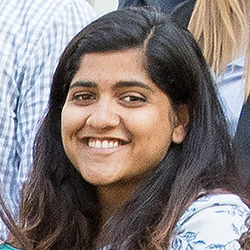We caught up with three Summer Research Training Program (SRTP) 2017 participants at the culminating research symposium this past summer. We wanted to hear what each had to say about their educational journey and their SRTP experience.
 Eric Barrientos
Eric Barrientos
Arizona State University, Tempe
Summer research project: “My project in the lab of Shaeri Mukherjee focused on using an intracellular pathogen, Legionella, to learn more about how cells respond to stress due to unfolded proteins during infection.”
What is the best thing about your experience in UCSF’s SRTP? “The opportunity to learn with and learn from an incredible group of highly intelligent, creative, and motivated students from around the country. I felt a sense of camaraderie between everyone in the 2017 SRTP cohort that I think would be hard to match by any other summer program.”
What do you want to study as a PhD student? “After this summer, I am sure I will apply to the Medical Scientist Training Program at UCSF because of the commitment I saw in UCSF students, faculty, and staff to work together towards discoveries that advance the human condition. I’ve gotten interested in bioprinting which I think would be a fantastic area of study for my PhD because it combines cell biology, biomaterial science, engineering, and I believe will really help bring tissue engineering from the bench to the bedside.”
What was the greatest barrier you faced in going to college? How did you overcome that barrier? "My greatest barrier in going to school was certainly financial. I come from a single parent household in non-wealthy neighborhood, and while my mother works harder than I could ask for my sister and me, college costs have affected everyone. I knew this would be my greatest challenge years before I started applying to schools and focused on earning the best grades I could and studying for tests like the PSAT and ACT to earn as many need and merit based scholarships as possible."
What is the greatest barrier you face in pursuing a PhD? "I am doing my best to create a competitive application portfolio to apply to MD/PhD programs around the country and while I’m having a great time accumulating fantastic experiences so much is required that I often feel there are not enough hours in the day. Primarily, I wish I had more time to spend on research at ASU because it drives me and I’m passionate about it, but I also have classes and part-time job. And of course, I’d always love to put more time into my extracurricular and volunteering. My solution is just trying to focus on one thing at a time when possible and getting as much as I can out of each experience."
Was there anyone at UCSF who has been especially helpful, inspiring, or encouraging to you during your time here? "While everyone at the Mukherjee lab was exceedingly generous with their time and knowledge my postdoc supervisor, Dr. Elias Cornejo, was particularly inspiring to me. It was very affirming to work with another child of Latin American immigrants who has accomplished so much in research. Dr. Cornejo has been doing research since he was an undergrad like myself and still retains a passion for science and wonderful humility I hope to have when I finish my graduate studies. Overall Dr. Cornejo is an excellent teacher as well as role model."
Eric's SRTP experience was supported by the National Science Foundation's Research Experience for Undergraduates (NSF/REU) program.
 Alejandro Morales Betancourt
Alejandro Morales Betancourt
University of Texas, San Antonio
Summer research project: "My research in the lab of Hao Li focused in aging. The main idea is to reverse aging by controlling the expression of specific proteins.”
What is the best thing about your experience in UCSF’s SRTP? "The friendly environment at UCSF…everyone treated me as a scientist, not as a student. Although my lab members knew that my knowledge in the field was limited, they gave me the confidence to develop the research project in a successful manner.”
What was the greatest barrier you faced in going to college? How did you overcome that barrier? “The greatest barrier that I faced when coming back to college was finding time to raise a child that now is a teenager, but that was also my main motivation. My family has been a great support, and we all together are making this happen.”
What is the greatest barrier you face in pursuing a PhD? "Moving from San Antonio with my family (wife and 13 year old son), and seeking affordable housing will be my number one barrier. Although, by the time I will be starting grad school next year, my son will be starting high school, so I think that is the perfect timing to move to a different place. I am convinced that there are excellent programs at UCSF, so I would like to end up moving to San Francisco, or the Bay Area."
What do you want to study as a PhD student? "As a PhD student I would like to study Tissue Engineering, specifically tissue interphases to be applied in regenerative medicine. I am definitely applying to graduate school at UCSF, because I am interested in the bioengineering joint program.”
Was there anyone at UCSF who has been especially helpful, inspiring, or encouraging to you during your time here? "I learned a lot from my mentor, Jiashun Zheng, because he was always positive, even when we had bad results or no results at all. He helped me to overcome frustration and keep trying. I would also like to express my gratitude to the UCSF SRTP, for giving me this opportunity that made me grow not only as a scientist, but as a person too."
Alejandro's SRTP experience was supported by the Amgen Foundation's Amgen Scholars program. SRTP students designated as Amgen Scholars move through the SRTP program with other participants, but they also have the privilege of attending the Amgen Symposium, where students hear firsthand from leading scientists working in industry and academia. Over the course of the symposium, held at UCLA, Amgen Scholars have the chance to share their summer research projects with their peers and deepen their understanding of drug discovery and development.
 Shivani Phadke
Shivani Phadke
Rochester Institute of Technology, Rochester, NY
Summer research project: "In the lab of Seemay Chou, I was studying a protein involved in a bacterial competition pathway. This toxin is used by P. aeruginosa to attack neighboring bacteria."
What is the best thing about your experience in UCSF’s SRTP? “It allowed me to not only immerse myself in research, but to share a living space with 49 incredibly talented future scientists. I have never been surrounded with so many friendly faces, with ambitions and interests similar to my own.”
What do you want to study as a PhD student? "I want to be part of creating innovative measures for the prevention and treatment of infectious disease, particularly those that are vector-borne."
What do you think distinguishes UCSF as a graduate school? “UCSF provides students with an opportunity to challenge themselves and do cutting-edge research, while still respecting their need for a healthy workspace. One of the common concerns with graduate school is the mental health of the students, and UCSF takes measures to support the needs of their students. Science is stressful, and this institution does a great job of helping students manage that stress and be happy during graduate school.”
Shivani's SRTP experience was supported by the Amgen Foundation's Amgen Scholars program. As noted above, SRTP students designated as Amgen Scholars move through the SRTP program with other participants, but they also have the privilege of attending the Amgen Symposium, where students hear firsthand from leading scientists working in industry and academia. Over the course of the symposium, held at UCLA, Amgen Scholars have the chance to share their summer research projects with their peers and deepen their understanding of drug discovery and development.
Read about the 30th Anniversary of UCSF's Summer Research Training Program (SRTP) in 2017.

